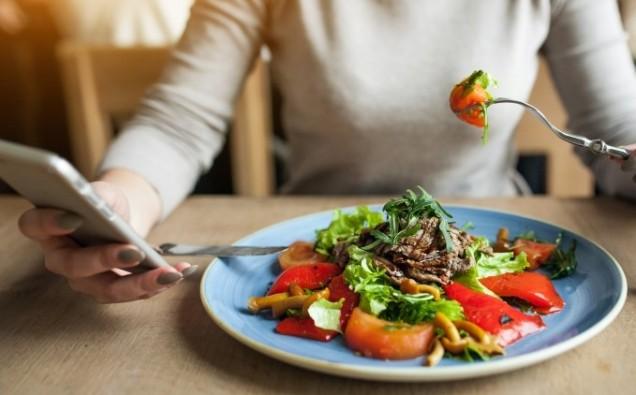Researchers from Aston University have found that people following healthy eating accounts on social media for as little as two weeks ate more fruit and vegetables and less junk food.
Previous research has shown that positive social norms about fruit and vegetables increases individuals’ consumption. The research team sought to investigate whether positive representation of healthier food on social media would have the same effect. The research was led by Dr Lily Hawkins, whose PhD study it was, supervised by Dr Jason Thomas and Professor Claire Farrow in the School of Psychology.
The researchers recruited 52 volunteers, all social media users, with a mean age of 22, and split them into two groups. Volunteers in the first group, known as the intervention group, were asked to follow healthy eating Instagram accounts in addition to their usual accounts. Volunteers in the second group, known as the control group, were asked to follow interior design accounts. The experiment lasted two weeks, and the volunteers recorded what they ate and drank during the time period.
Overall, participants following the healthy eating accounts ate an extra 1.4 portions of fruit and vegetables per day and 0.8 fewer energy dense items, such as high-calorie snacks and sugar-sweetened drinks, per day. This is a substantial improvement compared to previous educational and social media-based interventions attempting to improve diets.
Dr Thomas and the team believe affiliation is a key component of the change in eating behaviour. For example, the effect was more pronounced amongst participants who felt affiliated with other Instagram users.
The 2018 NHS Health Survey for England study showed that only 28% of the UK population consumed the recommended five portions of fruit and vegetables per day. Low consumption of such food is linked to heart disease, cancer and stroke, so identifying ways to encourage higher consumption is vital. Exposing people to positive social norms, using posters in canteens encouraging vegetable consumption, or in bars to discourage dangerous levels of drinking, have been shown to work. Social media is so prevalent now that the researchers believe it could be an ideal way to spread positive social norms around high fruit and vegetable consumption, particularly amongst younger people.
Dr Thomas said:
“This is only a pilot intervention study at the moment, but it’s quite an exciting suite of findings, as it suggests that even some minor tweaks to our social media accounts might lead to substantial improvements in diet, at zero cost! Our future work will examine whether such interventions actually do change our perceptions of what others are consuming, and also, whether these interventions produce effects that are sustained over time.”
Dr Hawkins, who is now at the University of Exeter, said:
“Our previous research has demonstrated that social norms on social media may nudge food consumption, but this pilot demonstrates that this translates to the real world. Of course, we would like to now understand whether this can be replicated in a larger, community sample.”

